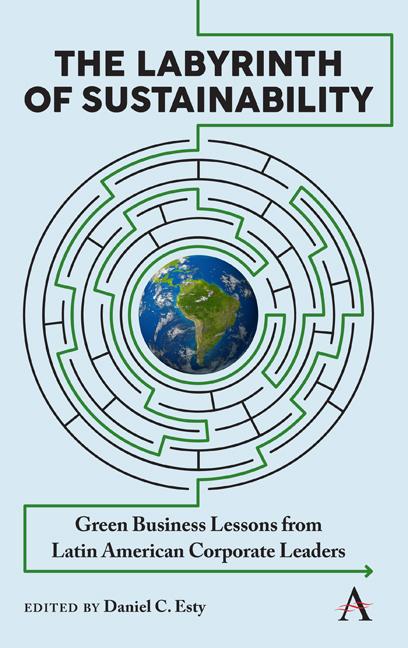Book contents
- Frontmatter
- Dedication
- Contents
- List of Illustrations
- Acknowledgments
- Notes on Contributors
- Introduction
- Chapter 1 Water Conservation in Scarcity Conditions: Corporate Sustainability at Mexico's FEMSA Group
- Chapter 2 Walmart Mexico: Clean Energy to Reduce Costs and Improve Corporate Image
- Chapter 3 Grupo Vanguardia Revitalizes Plastics Recycling in Honduras
- Chapter 4 Nissan Mexicana's Renewable Power Partnership
- Chapter 5 Tecnosol Follows the Sun
- Chapter 6 Rizek Pushes the Dominican Republic Cocoa Industry toward Sustainability
- Chapter 7 Centrosur Leads the Way to Sustainability in Ecuador
- Chapter 8 A Resilient World: Bavaria Builds Its Case on Water
- Chapter 9 Grupo Herdez Takes the Initiative in Mexico's Food Market
- Chapter 10 Chile's Las Palmas Avocado Orchard: Water Consumption Reduction in Agriculture
- Chapter 11 Mabesa: Increasing Global Competitiveness with Eco-friendly Disposable Products
- Chapter 12 Water Use Efficiency Initiatives in Nestlé's Value Chain and the Implications of the Company's Business Model
- Notes
- Index
Chapter 9 - Grupo Herdez Takes the Initiative in Mexico's Food Market
Published online by Cambridge University Press: 29 May 2019
- Frontmatter
- Dedication
- Contents
- List of Illustrations
- Acknowledgments
- Notes on Contributors
- Introduction
- Chapter 1 Water Conservation in Scarcity Conditions: Corporate Sustainability at Mexico's FEMSA Group
- Chapter 2 Walmart Mexico: Clean Energy to Reduce Costs and Improve Corporate Image
- Chapter 3 Grupo Vanguardia Revitalizes Plastics Recycling in Honduras
- Chapter 4 Nissan Mexicana's Renewable Power Partnership
- Chapter 5 Tecnosol Follows the Sun
- Chapter 6 Rizek Pushes the Dominican Republic Cocoa Industry toward Sustainability
- Chapter 7 Centrosur Leads the Way to Sustainability in Ecuador
- Chapter 8 A Resilient World: Bavaria Builds Its Case on Water
- Chapter 9 Grupo Herdez Takes the Initiative in Mexico's Food Market
- Chapter 10 Chile's Las Palmas Avocado Orchard: Water Consumption Reduction in Agriculture
- Chapter 11 Mabesa: Increasing Global Competitiveness with Eco-friendly Disposable Products
- Chapter 12 Water Use Efficiency Initiatives in Nestlé's Value Chain and the Implications of the Company's Business Model
- Notes
- Index
Summary
Abstract
Grupo Herdez is a leading producer of shelf-stable foods in Mexico and a leader in the Mexican food market of the United States. The company has more than 9,000 employees and its 40 product categories include sauces, canned food, dairy items, and organic products. Grupo Herdez has ambitious goals for its sustainability strategy, built around two major initiatives: (1) reducing greenhouse gas (GHG) emissions at its facilities through wind power, and (2) agricultural development with the brand Aires de Campo, which provides training and certification for organic products and fair trade practices. As the company's sales of organic products grew, it found its energy footprint increasing. In response, Grupo Herdez has dedicated itself to clean energy— renewable energy sources are now being used at nearly half of the company's production facilities— and GHG emissions have been halved. This case study analyzes these initiatives in the context of Mexican energy reform, as well as the nation's nutrition and obesity crisis.
Introduction
Compañia Comercial Herdez was established in 1914 in the city of Monterrey, Nuevo León, Mexico. Ignacio Hernandez del Castillo started as sales director in 1929 and went on to purchase the company in 1941. He and his sons have built the company from a distributor of toiletries and personal hygiene products to a large multinational provider of shelf-stable foods (foods that can be safely stored in a sealed container at room temperature). This case study focuses on two of the company's sustainability initiatives: its wind power generation project and its efforts to build an organic food market in Mexico. The chapter also provides an overview of the Mexican food sector as context for Grupo Herdez's sustainability strategy.
Today, Grupo Herdez is a multinational company with more than 1,500 products in more than 40 different categories sold in 17 countries. The company grew substantially starting in the 1940s by diversifying its initial products and creating strategic alliances. In the process, Grupo Herdez became one of Mexico's leading distributors of local and international food brands as well as of its own products, which include vegetables, sauces, mole (a spicy Mexican sauce made from chili and chocolate), mayonnaise, mustard, and jams.
- Type
- Chapter
- Information
- The Labyrinth of SustainabilityGreen Business Lessons from Latin American Corporate Leaders, pp. 125 - 140Publisher: Anthem PressPrint publication year: 2019

